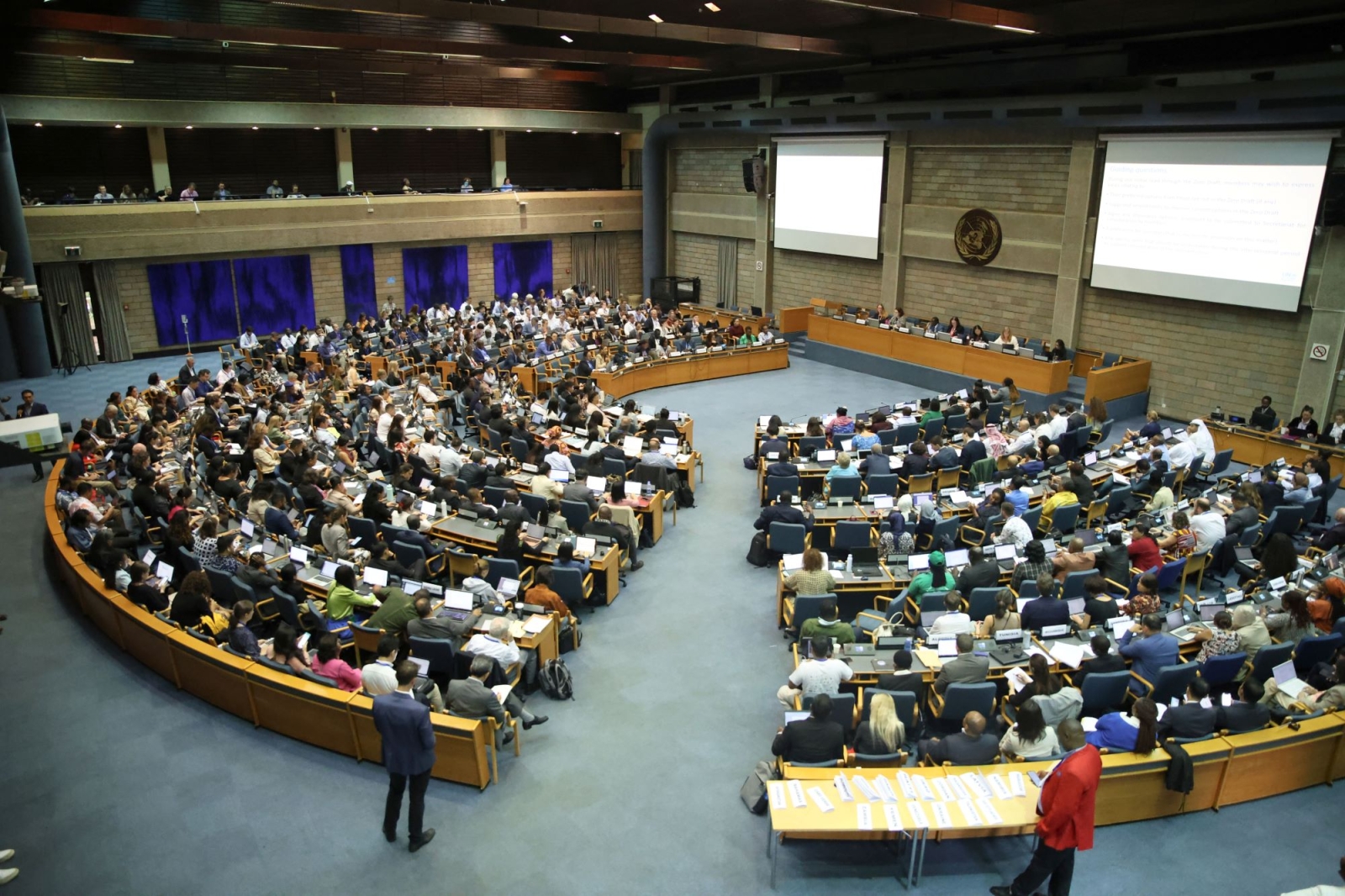An analysis of the participants present at the third round of negotiations (INC-3) for the global plastics treaty found that the number of lobbyists related to the fossil fuel and chemical industries increased by 36 percent from INC-2, reaching a total of 143 lobbyists, a number higher than that of delegates from G7 countries.
The analysis, based on the provisional list of INC-3 participants published by UNEP, was conducted by Center for International Environmental Law (CIEL), Greenpeace, Beyond Petrochemicals, International Pollutants Elimination Network (IPEN) and Break Free From Plastic. Only the information provided in the list of participants was used to establish a delegate's connection to the fossil fuel or chemical industry. "This means that our estimate is likely to be conservative as some delegates may choose not to disclose their industry ties," the NGOs explain.
How many lobbyists are there at the Global Plastic Treaty negotiations?
According to the analysis, 6 member countries have lobbyists in their national delegations: 5 for Malaysia, 4 for the Dominican Republic, 3 for Oman, and 1 each for China, Iran, and Kenya. Among the UN General Assembly Observers, 6 participants were also identified as lobbyists. The rest of the fossil fuel and chemical industry lobbyists identified by the analysis are registered at INC-3 through nongovernmental associations.
For comparison, the members of the Scientists' Coalition for an Effective Plastics Treaty present at the negotiations are only 38. Of the 162 countries participating in the negotiations, 97 were able to send 4 or fewer delegates each (56 countries have only 2), while some associations representing the plastics industry are present with 5 delegates each. This is the case with Plastics Europe, World Plastics Council, Association for European Manufacturers of Expanded Polystyrene (EUMEPS), and Plastics Industry Association.
Plastics and chemicals like oil and tobacco
The study Conflicts of Interest in the Assessment of Chemicals, Waste, and Pollution published in the scientific journal Environmental Science and Technology in early November showed how the plastics and chemical industries have used at least a dozen of the tactics established by the oil and tobacco industries to "create doubts in favor of their own interests, i.e., to counter scientific evidence and/or promote misleading narratives favorable to their own financial interests." These are the same tactics described in the book Merchants of Doubt by Oreskes and Conway.
The requests to UNEP
According to civil society organizations and the scientific community, UNEP should put in place a robust conflict of interest policy. "In the plastics treaty and other spaces, such as the climate negotiations, UNEP should start recognizing and identifying corporate actors whose interests fundamentally conflict with the negotiations, such as the petrochemical and fossil fuel industries," Giulia Carlini, Environmental Health Manager and Senior Attorney at the Center for International Environmental Law, told Renewable Matter.
“We are seeing UNEP is already starting to acknowledge this lack of transparency in the climate negotiations, but it’s not enough. There should be a screening of participants, and a disclosure of interests on the affiliations and funding related to these ‘conflicted’ industries.”
Also read: GLOBAL PLASTIC TREATY: ZERO DRAFT PUBLISHED
WHO’s precedent
Carlini adds that “the World Health Organization (WHO)’s Framework Convention on Tobacco Control is a model UNEP could learn from: there, the tobacco industry’s engagement is restricted, based on the need to protect public health policies from commercial and vested interests of the tobacco industry.”
In that case, WHO did not hesitate to urge national leaders to "combat industry attacks" that sought to "undermine the treaty." In fact, Article 5.3 of the Framework Convention on Tobacco states, "In setting and implementing their public health policies on tobacco control, Parties shall act to protect these policies from the commercial and other vested interests of the tobacco industry in accordance with national law."
INC's response
Renewable Matter asked UNEP INC (Intergovernmental Negotiation Committee) Secretariat what measures UNEP plans to put in place to create a robust conflict of interest policy and accountability framework. An INC Secretariat spokesperson responded by explaining that "as part of the INC process for engagement of non-state actors, all private sector observers registered provide their name, affiliation and organization to aid transparency. All organizations are allocated a maximum of one floating pass for plenary sessions. This approach is consistent with other global processes. According to the provisional rules of procedure being applied to the work of the INC, anyone who registers through the modalities described above has the ability to register. The members of the committee will have to make decisions regarding any perceived conflict of interest.”
This article is also available in Italian / Questo articolo è disponibile anche in italiano
Photos by IISD/ENB | Anastasia Rodopoulou



